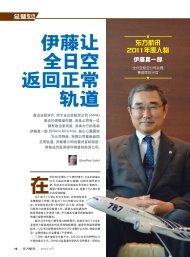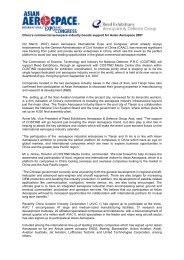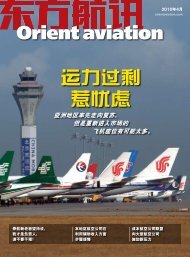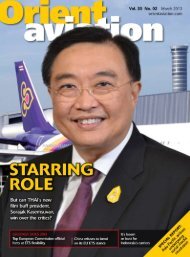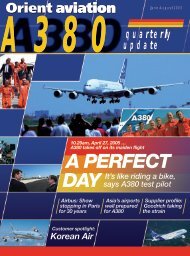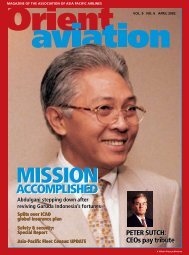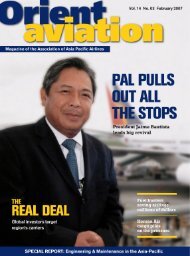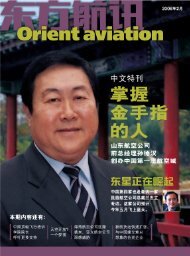LIFE AFTER SQ006 - Orient Aviation
LIFE AFTER SQ006 - Orient Aviation
LIFE AFTER SQ006 - Orient Aviation
- No tags were found...
You also want an ePaper? Increase the reach of your titles
YUMPU automatically turns print PDFs into web optimized ePapers that Google loves.
e x e c u t i v e i n t e r v i e wA321s later. That was an excellent decision.It’s a very popular aircraft with our customersand our crews and it means instead of operatingB767s on short-haul European routes, onroutes where that aircraft was too big, we’reable to operate a more appropriately sized aircraft.I think both those planks of the strategywere absolutely right.”But Eddington said there was no room inthe fleet for the Very Large Aircraft, the 550-seat A380 in the near future.One reason is that partner and oneworldalliance member Qantas Airways has ordered12 of the aircraft. “Qantas will be operatingthe A380s under our joint service agreement.We will be code-sharing. Qantas will operatethem from Sydney through Bangkok to theUK. There will be A380 capacity which we cantake advantage of. We are delighted Qantaswill be operating it, but BA has other prioritiesat the moment.”Eddington said he felt some frustrationover the failure of complex negotiations aimedat securing a BA-KLM merger, a plan ultimatelyfoiled by European Commission monopolyconcerns.“In the bilateral system, aeropolitical realitiesdrive a lot of things in this industry and oneof the things they do is make consolidationmuch more difficult because ownership andcontrol issues, which are fundamental to thebilateral process, often determine what youcan and can’t do. Are they frustrations? Yesthey are, but they are the realities you haveto live with.”He still believes European aviation willconsolidate. “That is inevitable and the reasonis the economic drivers are powerful.“The economic pressures to consolidate,particularly in tough times, are real. Theaviation industry is no different to any otherindustry. We have seen consolidation globallyin the car industry, the telecommunication industryand the banking industry. Internationalaviation is more fragmented in many waysthan any of them.”Eddington has a message for the Asia-Pacific airline industry; BA will not be investingin any more of the region’s carriers and, despiterumours, it will not be changing its 25% stakein Qantas.“Any investments we make will be inEuropean airlines as part of a consolidatingprocess in Europe. That will be our focus. Youwon’t see any investment by us in Asia,” hesaid.He denied conflicting reports that suggestedBA planned to either raise its Qantasstake or dump it altogether.” We have noplans to raise or trim the stake. It’s a significantinvestment, but not a dominant one.“We have an excellent relationship. Wethink the current relationship underpins thestrong links between the two carriers, the jointservice agreement between the UK and Australiaand our joint membership in oneworld.Yet it does not crowd Qantas managementin any shape or form. I think it is pitched justright.”‘I have seen a wideningof the gap between theCathay Pacifics and theSIAs on the one hand andsome of the other airlinesin Asia on the other. Inpart, that is a reflection ofthe quality of leadership’– EddingtonIn Asia, BA will focus on building relationshipswith partners through the oneworld alliance.“We will serve the key markets directly asBA on a non-stop basis wherever we can fromLondon Heathrow. But we will serve many ofthe smaller markets through our alliance relationshipswith Qantas and Cathay Pacific.”Eddington believes some of the region’sairlines fared far better than others throughthe 1997-98 economic crisis. “Every countryresponded differently. Airlines respondeddifferently and the strong airlines in Asia, thebest managed airlines like those of the qualityof Cathay Pacific and Singapore Airlines,have strengthened their relative positions as aresult of the quality of their management anddecision-making.”All Asian carriers benefitted substantiallyfrom the boom of the mid-1980s and mid-1990s, because “a rising tide lifts all ships”,he said.“But in the really tough times it is airlineswith the strong brands, with good managementteams, with a good product and witha strong customer base which really excel. Ihave seen a widening of the gap between theCathay Pacifics and the SIAs on the one handand some airlines in Asia on the other. In part,that is a reflection of the quality of leadership.People like David Turnbull and Philip Chen atCathay and Dr Cheong and Michael Tan at SIAare experienced people who run airlines oncommercial grounds.”Eddington is reluctant to comment publiclyon the problems of his former charge, Ansett,now wholly owned by Air New Zealand.However, he did observe that putting twoairlines together was “a challenge”.“Think of the difficulties Qantas had in theearly days merging with Australian Airlinesand look at the problems in British Airways,putting BOAC and BEA together all theseyears ago. But if everyone is focused on ityou can do it.“There is plenty of evidence to suggestthese things can be done and I have no doubtthat Gary Toomey and the team will be focusedon getting it done.”Eddington is looking forward to sittingon the Qantas board. “I think James Strong[Qantas chief executive] and his team havedone a terrific job, through the privatisationof the airline and beyond.“The BA relationship with Qantas is a verygood one and I am looking to reinforce that.It’s great to be involved again in an Australiancompany, although clearly the overwhelmingmajority of my time will be spent on mattersBA.“But sitting on the Qantas board wearinga BA hat, my primary focus obviously will beto do what I can to help Qantas continue togrow and strengthen. I’m also mindful of thequality of the links between BA and Qantas. Ibelieve they are important links for both carriers.I am going to help try and reinforce themif I can.”26 | <strong>Orient</strong> <strong>Aviation</strong> | March 01




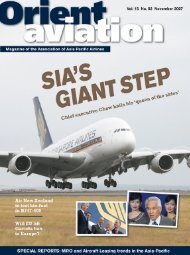
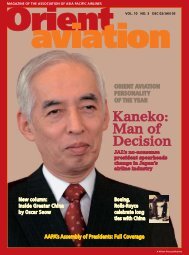
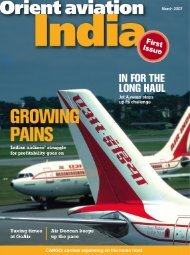
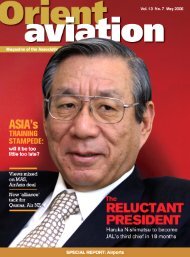
![OAMag-V7N4-Cover [Converted] - Orient Aviation](https://img.yumpu.com/48598575/1/190x255/oamag-v7n4-cover-converted-orient-aviation.jpg?quality=85)
